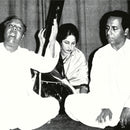

Description
Following on from last year’s acclaimed Vrindavan 1982 by rudra veena master Z.M. Dagar, Black Truffle is thrilled to present a pair of archival releases from the Dagar Brothers, among the most revered 20th century exponents of the ancient North Indian dhrupad tradition. The vocal duo of Moinuddin and Aminuddin Dagar (sometimes referred to as the ‘senior’ Dagar Brothers to distinguish them from their younger siblings, Zahiruddin and Faiyazuddin Dagar), belonged to the nineteenth generation of a family of musicians in which dhrupad tradition has been kept alive through patrilinear transmission, each generation undergoing a rigorous education of many years’ duration that can include singing up to twelve hours each day.
Famed for the meditative purity of their approach to dhrupad, the Dagar Brothers helped to keep the tradition alive in the years after Indian independence in 1947, when the royal courts that had traditionally patronised dhrupad musicians were abolished. Many Western listeners were first introduced to dhrupad by the Dagar Brothers’ tour of Europe in 1964-65 and their LP in UNESCO’s ‘Musical Anthology of the Orient’ collection, both organised by pioneering musicologist and scholar of Indian culture Alain Daniélou. Documents from this tour are especially precious, as Moinuddin Dagar passed away in 1966. Unheard until now, Berlin 1964 – Live (released alongside BT114, a newly discovered studio session from the same trip) documents a concert held at the Charlottenburg Palace in September 1964.
Accompanied only by Moinuddin’s wife Saiyur on tanpura and Raja Chatrapati Singh on pakhawaj (a large double-headed drum), the brothers present stunning performances of two ragas stretching out over 65 minutes, exemplifying what a journalist at the time called the ‘pristine severity’ of their style. Much of each piece is taken up by the alap, the highly improvised exposition section where the notes of the raga are gradually introduced as the singing builds in intensity. As Francesca Cassio points out in her extensive liner notes, both performances are somewhat unorthodox in beginning with the raga scale being sung in its entirety, ascending and descending; this is probably, as she suggests, a strategy to introduce the European audience to the language of the music they are about to hear. From there, both ragas settle into alaps of breathtaking beauty, with the two brothers trading long solo passages that move gradually from extended held notes at the bottom of the scale to animated melodic variations as it ascends in pitch. Within the atmosphere of meditative attention, the range of melodic, rhythmic, and timbral invention is remarkable. Especially on the opening ‘Rāga Miyān kī Todī’, the final moments of the alap find the voices at a peak of intensity, their microtonal ornamentation taking on an ecstatic, warbling quality. Only once the wordless, free-floating alap is over and the composition proper begins to the brothers sing in unison, joined by the pakhawaj for a rhythmic section that in both ragas develops gradually into a propulsive display of melodic invention and metrical nuance. Accompanied by detailed liner notes and striking archival images, Berlin 1964 – Live is a rare document of these masterful exponents of one of the world’s most profound musical traditions.
Listen
Refund Policy
RETURNS
----
Our policy lasts 7 days. If 7 days have gone by since arrival date, unfortunately we can’t offer you a refund.
To be eligible for a return, your item must be unused and in the same condition that you received it. It must also be in the original packaging.
To complete your return, we require a receipt or proof of purchase.Please do not send your purchase back to the manufacturer.
There are certain situations where only partial refunds are granted: (if applicable)
* Book with obvious signs of use
* CD, DVD, cassette tape, or vinyl record that has been opened.
* Any item not in its original condition, is damaged or missing parts for reasons not due to our error.
* Any item that is returned more than 7 days after delivery Refunds (if applicable)
Once your return is received and inspected, we will send you an email to notify you that we have received your returned item. We will also notify you of the approval or rejection of your refund.
If you are approved, then your refund will be processed, and a credit will automatically be applied to your credit card or original method of payment, within a certain amount of days.
Late or missing refunds (if applicable)
If you haven’t received a refund yet, first check your bank account again.
Then contact your credit card company, it may take some time before your refund is officially posted.
Next contact your bank. There is often some processing time before a refund is posted.
If you’ve done all of this and you still have not received your refund yet, please contact us at om@meditations.jp.Sale items (if applicable)
Only regular priced items may be refunded, unfortunately sale items cannot be refunded.
Exchanges
We do not exchange items.
If the item wasn’t marked as a gift when purchased, or the gift giver had the order shipped to themselves to give to you later, we will send a refund to the gift giver and he will find out about your return.Shipping
To return your product, you should mail your product to: 3F Kasuga Bldg., 253 Demizu-cho, Kamigyo-ku, Kyoto, 26, 6020862, Japan.
You will be responsible for paying for your own shipping costs for returning your item. Shipping costs are non-refundable. If you receive a refund, the cost of return shipping will be deducted from your refund.
Depending on where you live, the time it may take for your exchanged product to reach you, may vary.
If you are shipping an item over $75, you should consider using a trackable shipping service or purchasing shipping insurance. We don’t guarantee that we will receive your returned item.
